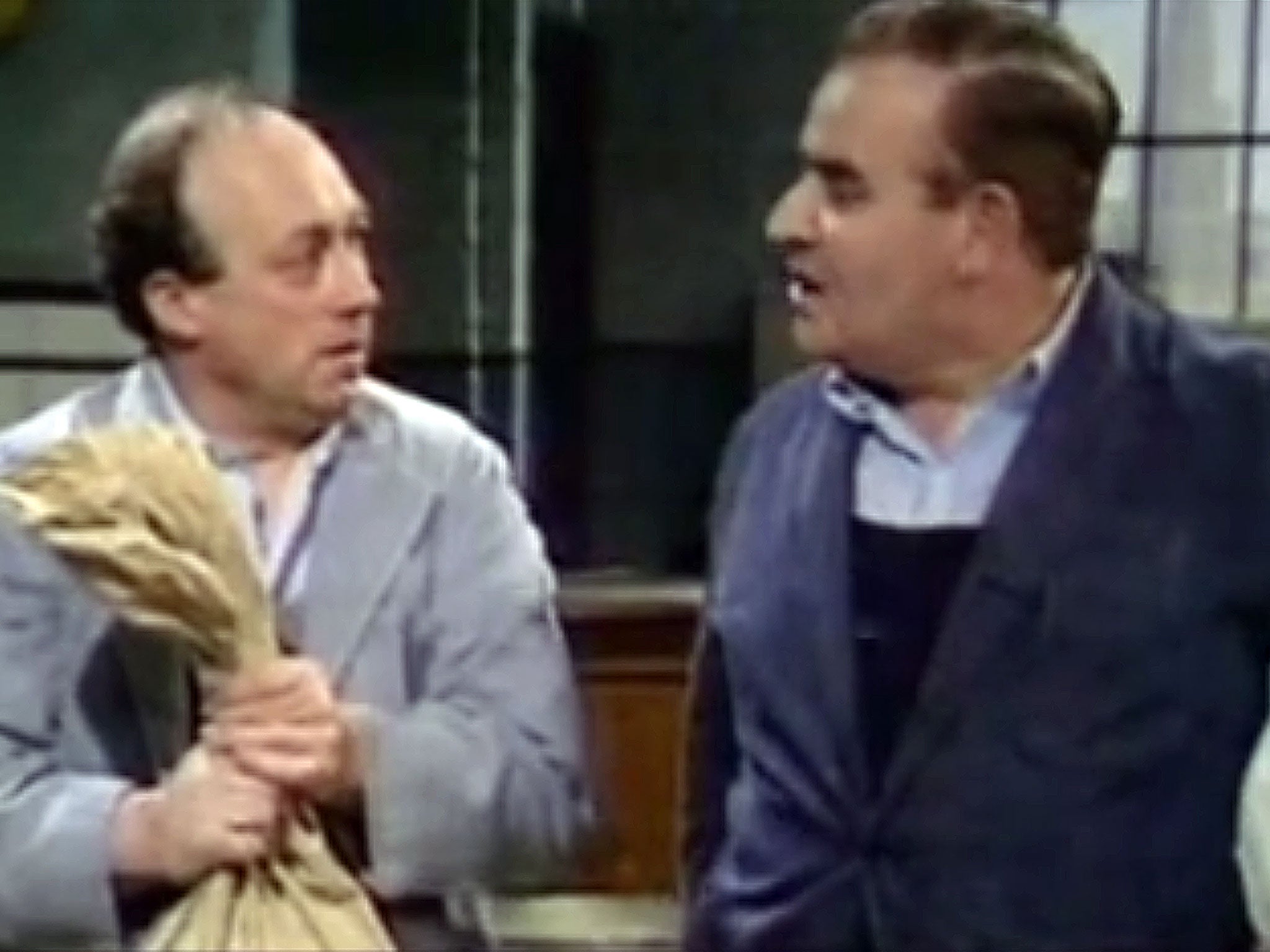Ken Jones: Stage and screen all-rounder who acted in groundbreaking new drama and created the prison snitch in 'Porridge'

Impish and furtive are words that spring to mind when remembering the many comedy performances of the ubiquitous Ken Jones. He was a gift for casting directors, always able to add a mischievous twinkle to a scene, frequently playing incompetent little devils whose ambition in life was little more than to be a spiv.
Like his co-stars, Ronnie Barker, Fulton Mackay and Richard Beckinsale, Jones was perfectly cast in the prison sitcom Porridge (1974), making likeable the contemptible 'Orrible Ives, the middle-aged guttersnipe who conned, cheated and snitched on the inmates of Slade.
At the same time, Jones was starring in another sitcom, YTV's The Squirrels (1974-77), in which he perfected his other great stock-in-trade, the mild-mannered middleman. Set in the accounts department of a television rental company, it was a stepping stone for writer Eric Chappell to his huge success with Rising Damp, and gave Jones a valuable opportunity to go on the front line as Rex, the hen-pecked, worrying, ineffectual bookkeeper, forever caught between his frenzied boss (Bernard Hepton) and his suffocating wife (Patsy Rowlands).
Kenneth Jones was born in Everton, Liverpool, in 1930, and after education and evacuation, worked in the building trade and as a signwriter. He had become interested in drama as a member of a local boy's club, and soon after leaving school joined an amateur group, the Merseyside Community Theatre, where he met Sheila Fay, whom he married in 1954.
Marriage for them was not about settling down: they both swiftly enrolled at Rada, graduating in 1958. Jones worked briefly at Glasgow Citizen's Theatre before being scooped up by Joan Littlewood's Theatre Workshop at Stratford East, east London an ideal place for him. It was a Noah's ark of real people playing real people, devoid of matinee idols and prima donnas. Writer Allan Prior said of him in 1968: "Actors like Ken Jones make you wonder if they are actors at all or people who have walked in off Lime Street. No Actors Studio could teach Mr Jones anything. He is for real."
His everyday features proved useful in Alun Owen's Progress to the Park at the Saville Theatre in 1961, alongside Tom Bell and future television playwright Julia Jones, and They Might be Giants with Harry H Corbett, Theatre Workshop's first co-production in 1961.
With Tom Conti and Isobel Black, he appeared in a double bill at the Traverse in Edinburgh by Polish author Slawomir Mrozek; the first play, The Party, made fascinating use of deafening silences as three people become increasingly desperate for music and partying in a room empty save for broken instruments. In the second, Enchanted Night, two businessmen sleep while a dream girl drifts in but eventually fades away, grown impatient with their possessive arguing. The two plays are worth reappraisal and revival, and Jones's ease in such fare makes one wish he had had a crack at Pinter.
He went from strength to strength in the theatre, starring in Donald Howarth's typically tender and exploratory love story A Lily in Little India (1965) at Hampstead Theatre with Jill Bennett and Ian McKellen, which subsequently transferred to the St Martin's, critics praising his "fine performance loaded with middle-aged coyness and maudlin sensuality".
By now, however, television was taking up more and more of his time. He made his first small-screen appearance in an episode of the long-forgotten drama Probation Officer in 1962, but with the advent of The Wednesday Play in 1964 more toothsome work was guaranteed.
After The End of Arthur's Marriage (1965), the series' first musical, Ken Loach cast him in his debut for the strand, the now lost Wear A Very Big Hat (1965), and gave him substantial roles in classics such as Neville Smith's soccer gem The Golden Vision (1968) and Jim Allen's furious The Big Flame (1969). Although he was happy to lay it on thick in comedy roles, Jones was nifty at naturalism, and belonged for a time to a bold squad of Liverpudlian lions including Smith, Bill Dean and Peter Kerrigan, who all excelled at Loach's angry, dowdy didactic.
He was sought after for sitcom, from Her Majesty's Pleasure (1968), a forgotten precursor to Porridge, and Last of the Baskets (1971) in which he played an unlikely peer to Arthur Lowe's butler. He starred opposite his wife in The Whackers (1975), about a Liverpool family of Catholics and Protestants, was stabbed by Robert Lang's silent psychopath in ATV's much-praised Thriller (1974) and, in a rare big screen appearance, played an old mate of Albert Finney's lovable loser in Gumshoe (1971).
He was Dad to one of The Liver Birds (1971) and Archangel Derek in Dead Earnest (1982), in which Andrew Sachs's teacher is killed by a champagne cork launched to celebrate a pools win. In 1977, he made a strong return to his Liverpool roots in Willy Russell's Breezeblock Park at the Mermaid, with Pete Postlethwaite, Wendy Craig and Julie Walters.
Throughout his full career, whether sighing wearily or nudging hopefully, he always raised a smile. When he wandered on to the screen he was absolutely the bloke next door, and even when the bloke next door was a petty thief or a busybody, one always felt it would be terrific fun to be his neighbour.
SIMON FARQUHAR
Kenneth Jones, actor, writer, and director, born Liverpool, 20 February 1930; married 1954 Sheila Fay; died Prescot, Merseyside, 13 February 2014.
Subscribe to Independent Premium to bookmark this article
Want to bookmark your favourite articles and stories to read or reference later? Start your Independent Premium subscription today.

Join our commenting forum
Join thought-provoking conversations, follow other Independent readers and see their replies